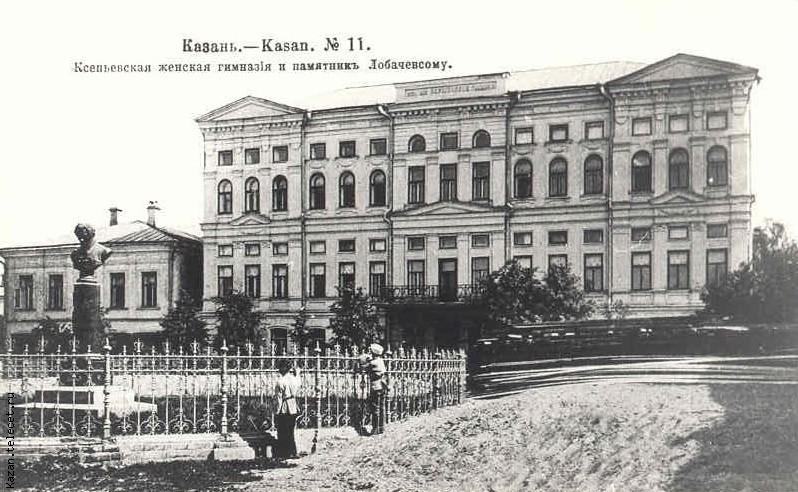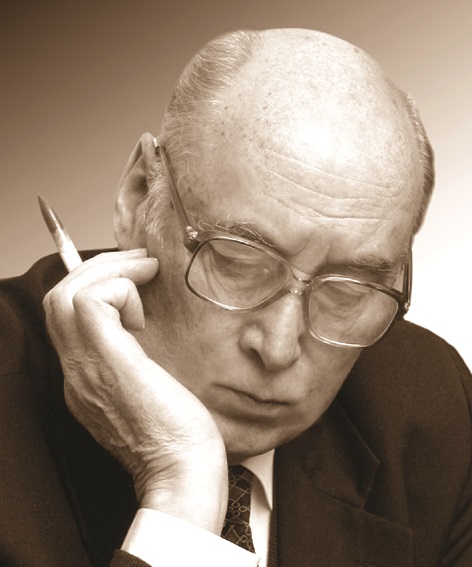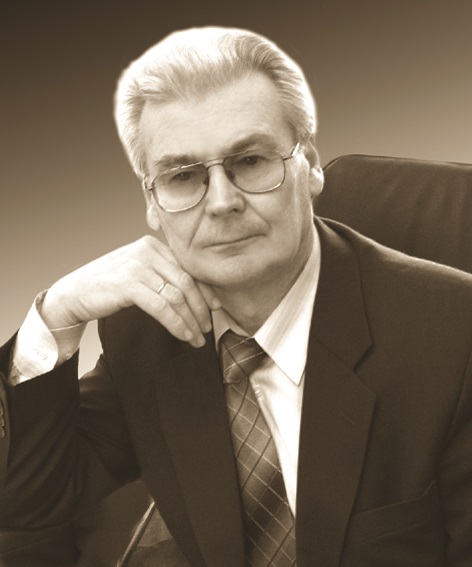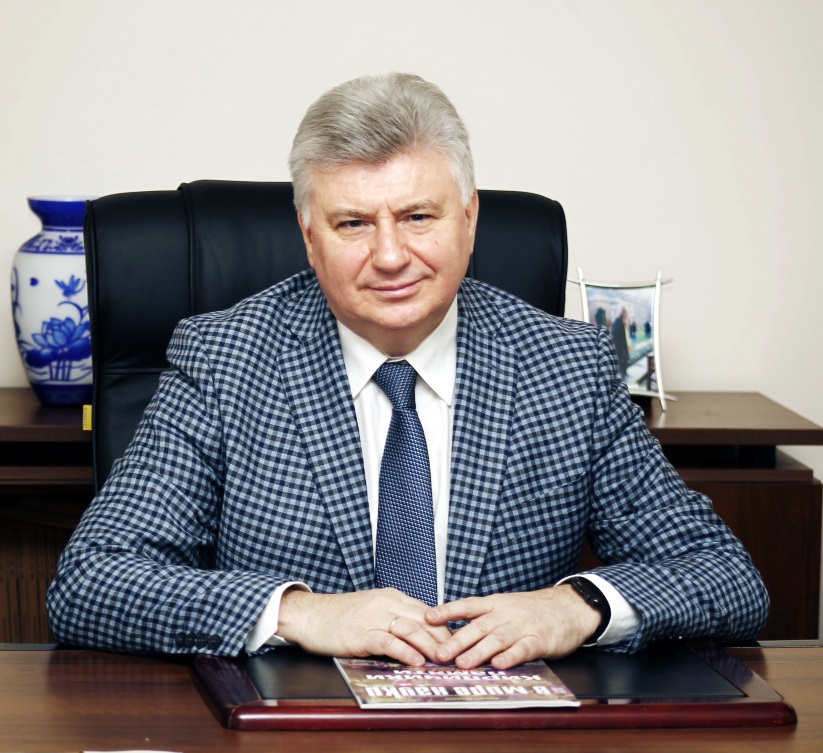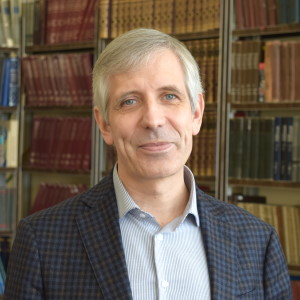The Federal Research Center “Kazan Scientific Center of the Russian Academy of Sciences” is the successor of the Kazan Branch of the USSR Academy of Sciences
During the World War II, the Institutes of the USSR Academy of Sciences were evacuated to Kazan, the capital of the Tatar ASSR. Moscow and Kazan scientists carried out joint research. With the active participation of an outstanding scientist and public figure Alexander Erminingeldovich Arbuzov, almost a month before the end of the World War II, the Council of People’s Commissars of the USSR adopted a resolution to establish the Kazan Branch of the USSR Academy of Sciences. On April 13, 1945, the Kazan Branch of the USSR Academy of Sciences was established in Kazan by the decision of the Council of People’s Commissars of the USSR.
On August 28, 1945, the Presidium of the USSR Academy of Sciences approved the structure of the Kazan Branch of the USSR Academy of Sciences: the Physico-Technical, Chemical, Geological and Biological Institutes, the Institute of Language and Literature, as well as the Water Management, the Energy, the Scientific and Technical Propaganda Sectors.
Alexander E. Arbuzov, Full member of the USSR Academy of Sciences and representative of the Presidium of the USSR Academy of Sciences in Kazan, became the head of the Kazan Branch of the USSR Academy of Sciences. He guided the formation of the original structure of the Kazan Branch of the USSR Academy of Sciences, and the rise and development of its institutions.
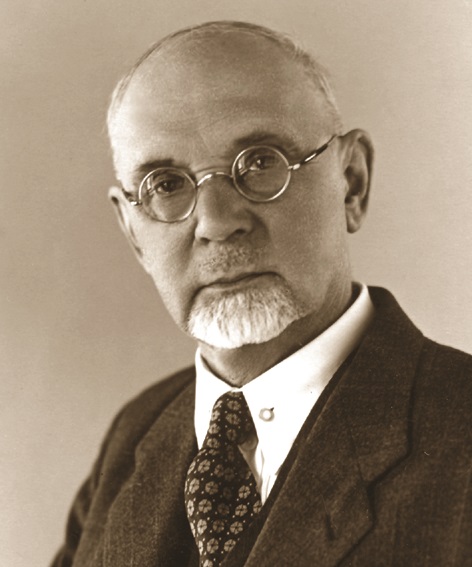
Alexander Erminingeldovich Arbuzov
Organizer of the Kazan Branch of the USSR Academy of Sciences and Chairman of the Presidium of the Kazan Branch of the USSR Academy of Sciences (1945-1963).
Stalin Prize winner (twice), Hero of Socialist Labor, Honored Worker of Science and Technology of the RSFSR and Tatar ASSR, Full member of the USSR Academy of Sciences.
Kazan Branch of the USSR Academy of Sciences was located in the building of the former Ksenin women’s gymnasium (an architectural monument) built in 1839 by the architect F.I. Petondi.
In 1947, the Chemical Institute of the Kazan Branch of the USSR Academy of Sciences was named after A.E. Arbuzov by the decree of I.V. Stalin.
In 1965, the A.E. Arbuzov Chemical Institute and the Kazan Institute of Organic Chemistry of the USSR Academy of Sciences (established in 1958) merged into the A.E. Arbuzov Institute of Organic and Physical Chemistry of the USSR Academy of Sciences. Boris A. Arbuzov, worthy successor to his father, outstanding scientist, Full member of the USSR Academy of Sciences, headed the A.E. Arbuzov Institute of Organic and Physical Chemistry from 1965 to 1971.
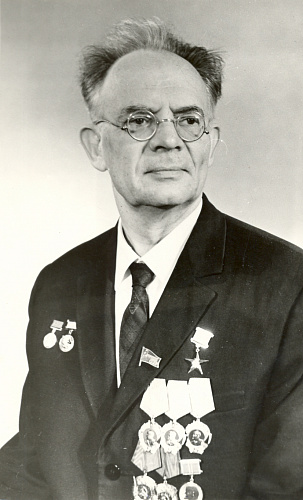
Boris Alexandrovich Arbuzov
Organizer and Director of the Kazan Institute of Organic Chemistry of the USSR Academy of Sciences, later the A.E. Arbuzov Institute of Organic and Physical Chemistry of the Kazan Branch of the USSR Academy of Sciences (1958-1971).
Hero of Socialist Labor, Lenin Prize and Stalin Prize winner, Full member of the USSR Academy of Sciences.
The academic institutes were established within the structure of the Kazan Branch of the USSR Academy of Sciences, the research areas of which were topical for the Volga region. After the completion of the reform of the higher school and the Academy of Sciences, the activity of the Kazan Branch of the USSR Academy of Sciences, suspended in 1963 along with other structures of the USSR Academy of Sciences, was resumed in 1972.
Further structural transformations of the Kazan Branch of the USSR Academy of Sciences took place under the guidance of Maksut M. Zaripov, the head of the revived Kazan Branch of the USSR Academy of Sciences.
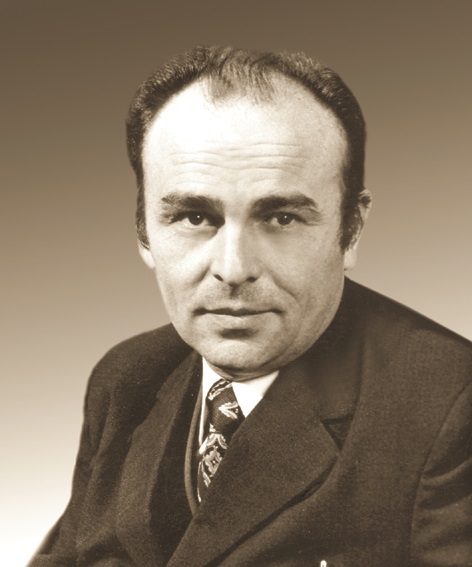
Maksut Mukhametzyanovich Zaripov
Chairman of the Presidium of Kazan Branch of the USSR Academy of Sciences (1972-1982).
State Prize winner of the USSR and State Prize winner of the Republic of Tatarstan, Honored Worker of Science and Technology of the Russian Federation and Tatar ASSR, Corresponding member of the Academy of Sciences of the Republic of Tatarstan.
The Kazan Branch of the USSR Academy of Sciences consisted of the Kazan Physical-Technical Institute, A.E. Arbuzov Institute of Organic and Physical Chemistry, Kazan Institute of Biology, and G. Ibrahimov Institute of Language, Literature and History.
Under the guidance of Petr A. Kirpichnikov, who headed the Kazan Branch of the USSR Academy of Sciences in 1982, the academic and higher school institutions collaborate within agreements on the creative scientific cooperation. The subdivisions of the scientific service and social sphere were developed and a house for the staff of the institutes was built.
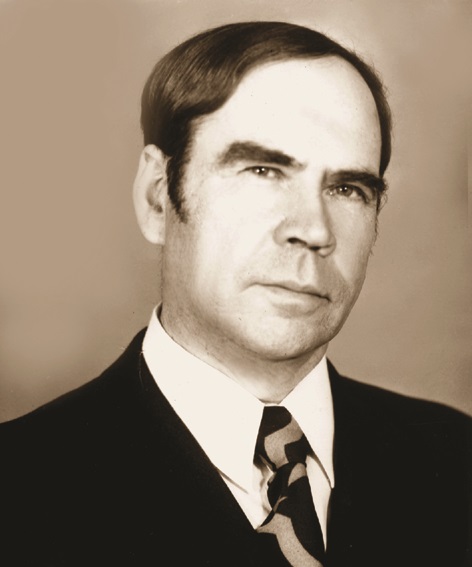
Petr Anatolievich Kirpichnikov
Chairman of the Presidium of Kazan Branch of the USSR Academy of Sciences (1982-1987).
State Prize winner of the USSR, Honorary member of the Academy of Sciences of the Republic of Tatarstan and the Academy of Sciences of the Republic of Bashkortostan, Honored Worker of Science and Technology of the Russian Federation and the Republic of Tatarstan, Corresponding member of the Russian Academy of Sciences.
In 1984, the Kazan Physical-Technical Institute was named after E.K. Zavoisky.
In 1990, under the guidance of Vyacheslav E. Alemasov, Kazan Branch of the USSR Academy of Sciences was one of the first to be transformed into a regional scientific center – the Kazan Scientific Center of the USSR Academy of Sciences (KazSC AS USSR).
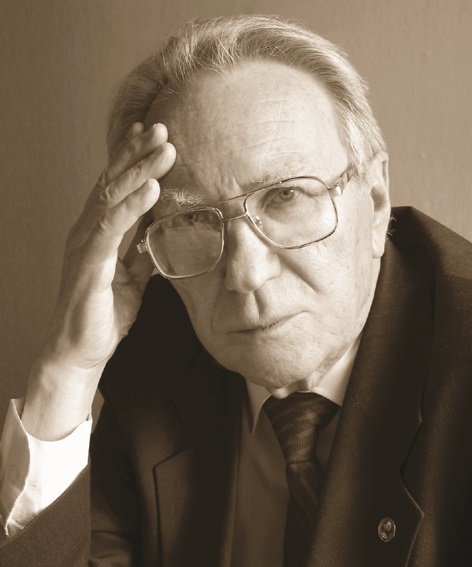
Vyacheslav Evgenievich Alemasov
Chairman of the Presidium of Kazan Branch of the USSR Academy of Sciences (1987-1991).
USSR State Prize winner (twice), Honored Worker of Science and Technology of the Russian Federation and the Republic of Tatarstan, Honorary member of the Academy of Sciences of the Republic of Tatarstan, Full member of the Russian Academy of Sciences.
At this time, the Zavoisky Kazan Physical-Technical Institute, A.E. Arbuzov Institute of Organic and Physical Chemistry, Kazan Institute of Biology, and G. Ibrahimov Institute of Language and Literature were a part of the KazSC AS USSR. Kazan schools of mechanics and power engineering have been developed. The Institute of the Mechanical Engineering and Department of Power Engineering were separated as individual institutes from the Kazan Physical-Technical Institute. The Presidium of the Kazan Scientific Center of the Russian Academy of Sciences included new scientific support units: the Patent Department and Department of Economics. The newspaper “Nauka” of the scientific community of the KazSC RAS was published and a house for young specialists was built.
In early 1990s of the perestroika period, Igor A. Tarchevsky, Chairman of the Presidium of the KazSC RAS, managed to preserve the institutes of KazSC RAS, scientific schools and highly qualified scientific staff.
Since 1992 – the Kazan Scientific Center of the Russian Academy of Sciences (KazSC RAS).
At this time, the Presidium of the KazSC RAS was searching for and introducing new forms of work. The KazSC RAS closely collaborated with the Academy of Sciences of the Republic of Tatarstan, which incorporated the Institute of Language, Literature and History in 1993. The development of the computer technology made it possible to initiate the creation of the local computer networks at all institutes. Further they served as a basis of the unified telecommunications network of the KazSC RAS.
When Aleksandr I. Konovalov, representative of the Kazan chemical school, was elected the Chairman of the Presidium of the KazSC RAS, the scientific and organizational activities of the Presidium included the planning of the work of institutes in conducting joint interdisciplinary research and research focused on the needs of the region. The practical implementation of the results of the scientific activity was searched for.
To coordinate the scientific activity in the region, the Presidium of the KazSC RAS successfully cooperated with the authorities of the Republic of Tatarstan, the Presidium of the Academy of Sciences of the Republic of Tatarstan, industry research institutes, enterprises and universities of Kazan. The Department of Information Technologies, which coordinates the development of telecommunication and computing resources in the KazSC RAS, and the Central Scientific Library of the KazSC RAS were organized.
The project of developing the scientific and educational computer network of the scientific and educational organizations of the Republic of Tatarstan “SENet-Tatarstan” was implemented. The capacities of the distributed supercomputer network were permanently increased.
In 2008, Aleksandr I. Konovalov proposed the candidacy of Oleg G. Sinyashin, who was formed as a scientist at the A.E. Arbuzov Institute of Organic and Physical Chemistry, as his successor. The members of the Presidium of the KazSC RAS supported this proposal.
As a result of the modern requirements for the practical use of the results of fundamental and applied research, the Presidium of the KazSC RAS under the guidance of Oleg G. Sinyashin develops a mechanism for the creation and implementation of innovative elaborations in close cooperation with the investment and venture funds and the authorities of the Republic of Tatarstan. These efforts are aimed at the implementation of strategies for socio-economic development and technological re-equipment of the Russia Federation and the Republic of Tatarstan. The material and technical base of scientific research and innovative developments is being modernized and strengthened: the unique scientific equipment is purchased that has no analogs in the Volga Federal District.
===
As a part of the reform of the Russian Academy of Sciences (RAS), by order of the Government of the Russian Federation of December 30, 2013 all institutes of the KazSC RAS were transferred to the FASO of Russia – the Federal Agency of Scientific Organizations of Russia.
To continue the reform of RAS basing on the need to most effectively address the basic challenges facing science, the Kazan Scientific Center of the Russian Academy of Sciences as one of the major regional centers of academic science with the well-known scientific schools in the field of chemistry, physics, biology and other fields of knowledge, was transformed into the Federal Research Center (FRC).
According to the administrative documents of the FASO, the institutes integrated into the FRC have to ensure breakthrough researches and practical developments in areas of strategic importance to the country (priority areas in the scientific and technical sphere). These works should both determine the formation of new sectors of post-industrial technology topical for the country and solve the tasks of consolidating the long-term global competitiveness of the basic sectors of the development of the Russian economics, scientific and technological support for the accelerated development of territories defining Russia’s global advantages, and provide the basis for the country’s long-term food independence. FRCs are the organizations that are responsible for achieving concrete results in the implementation of priority areas for the development of science and technology.
The basis of the Center should be formed by scientific academic organizations – world leaders in priority areas having scientific schools recognized by the scientific community. Taking into account that the solutions of the problems assigned to the FRC have a multi-, inter- and trans-disciplinary character, the coordination of the relevant research and development projects should be carried out within the single research program of the FRC.
On June 14, 2017, the head of the FASO of Russia issued the Order No. 353 “On the Reorganization of the Federal State Budgetary Institution of Science of the Kazan Scientific Center of the Russian Academy of Sciences”.
The process of the reorganization took exactly five months.
On November 14, 2017, the Head of the FASO signed the Order No. 906 “On approval of the new version of the Charter of the Federal State Budgetary Institution of Science FRC “KazSC RAS”.
On November 15, 2017, the official opening of the Federal State Budgetary Institution of Science FRC “Kazan Scientific Center RAS” was held at a meeting of the Council for Science and Education under the President of the Republic of Tatarstan. President of the Republic of Tatarstan Rustam Minnikhanov, Head of FASO Mikhail Kotyukov, President of the Russian Academy of Sciences Aleksandr Sergeev, Chairman of the Kazan Scientific Center RAS Oleg Sinyashin, Directors of institutes of the KazSC RAS and other officials took part in the meeting.
On November 21, 2017, the Kazan Scientific Center of the Russian Academy of Sciences was renamed the Federal State Budgetary Institution of Science Federal Research Center “Kazan Scientific Center of the Russian Academy of Sciences” (FRC “KazSC RAS”) in accordance with the Charter approved by the order of the FASO of Russia and on the basis of the entry sheet of the Unified State Register of Legal Entities FRC “KazSC RAS” of November 21, 2017.
The task of creating the FRC “KazSC RAS” before the end of 2017 was extremely ambitious taking into account both the tight deadlines for the project implementation and the reference of the institutes comprising FRCs to different fields of natural sciences and, accordingly, being under the scientific and methodological guidance of various Departments of RAS – Chemistry and Materials Sciences, Physical Sciences, Biological Sciences, Agricultural Sciences, etc. However, such diversity made it possible to form the Program of the Development of the FRC “KazSC RAS” not as a compilation of “mono-profile” topics of individual institutions, but in the form of interdisciplinary topics of the fundamental and applied research in priority areas.
The Federal Research Center “Kazan Scientific Center of the Russian Academy of Sciences” was established on the basis of the KazSC RAS and united eight organizations subordinated to the FASO of Russia:
- Arbuzov Institute of Organic and Physical Chemistry
- Zavoisky Physical-Technical Institute
- Kazan Institute of Biochemistry and Biophysics
- Institute of Mechanics and Engineering
- Tatar Research Institute of Agriculture
- Tatar Research Institute of Agricultural Chemistry and Soil Science
- Institute of Power Engineering and Advanced Technologies
- Polyclinic of Kazan Scientific Center of the RAS
O.G. Sinyashin, Full member of the Russian Academy of Sciences, is appointed the Director of the FRC “KazSC RAS”.
The Board of Trustees of the FRC “KazSC RAS” is headed by the President of the Republic of Tatarstan R.N. Minnikhanov.
===
In 2019, based on the results of the evaluation of the effectiveness, the FRC “KazSC RAS” was classified as a scientific institution of the 1st category and became one of the leading scientific organizations in Russia.
The priority research areas of the FRC “KazSC RAS” and the research topics under the state assignment concern natural resources, extraction and processing of hydrocarbon raw materials, quality of life, new materials and advanced technologies.
International collaboration is a key indicator of the scientific level of the FRC “KazSC RAS”, which implements such major international projects as:
- The Laboratory of Quantum Optics in Diamonds (headed by P. Hemmer, USA).
- The Laboratory of Plant Infectious Diseases (headed by V. Korzun, Germany).
- A Cooperation Agreement with the Boeing Company (USA) for testing components of civil aircraft structures.
- A joint project with the University of Zhengzhou (China) to establish an international research center in phosphorus chemistry.
Integration with Higher Education is essential for the successful development of academic science. Only in 2018-2019, the FRC “KazSC RAS” signed agreements on scientific and technical cooperation with 10 Russian higher education institutions, and, first of all, with Kazan Federal University – the alma mater of many scientists of the Kazan Scientific Center.
Within the framework of these Agreements, the following consortia were established:
“AGROECOCENOSIS of the “SOIL – PLANT – ANIMAL” System” (Participants: FRC “KazSC RAS”, Kazan State Academy of Veterinary Medicine, Kazan (Volga Region) Federal University, Kazan National Research Technological University).
“FUNDAMENTALS OF AGROSYSTEM MANAGEMENT UNDER GLOBAL CLIMATE CHANGE” (Participants: FRC “KazSC RAS”, Kazan State Agrarian University, Kazan (Volga Region) Federal University, Kazan State Academy of Veterinary Medicine).
Guiding talented youth toward careers in science and high technology, along with training the next generation of researchers, is another paramount focus of the Kazan Scientific Center. This is both “Basic Schools of the Russian Academy of Sciences” project – a joint project of the Russian Academy of Sciences and the Ministry of Education and Science of the Russian Federation which the FRC “KazSC RAS” coordinates in Tatarstan, and the “Youth laboratories” establishing within the structure of the FRC “KazSC RAS”.
On February 25, 2021, the term of Academician Oleg Sinyashin as Director of the FRC “KazSC RAS” was coming to an end. Re-elections were upcoming. The Head of the Kazan Scientific Center of the RAS announced his decision not to run for the position of Director of the Center, stating that it was necessary to pave the way for younger scientists.
By Order No. 57-р of the Ministry of Science and Higher Education of the Russian Federation dated March 2, 2021, the following candidates were approved to stand for election for the position of Director of the FRC “KazSC RAS” (listed in alphabetical order):
- Damir Gubaidullin, Dr. Sci. (Phys.-Math.), Corresponding Member of the RAS;
- Alexey Kalachev, Dr. Sci. (Phys.-Math.), Professor of the RAS;
- Andrey Karasik, Dr. Sci. (Chem.), Professor;
- Vladislav Chernov, Dr. Sci. (Biol.), Professor.
The candidates presented their development programs for the Kazan Scientific Center of the RAS, and debates were held across all scientific departments of the Center. Summing up the discussion of the candidates, Oleg Sinyashin remarked: “Today, we are choosing the path for the further development of the Kazan Scientific Center. Our plans are ambitious. With the support of the Republic of Tatarstan and Russia, and when young talented scientists become the head of the Federal Research Center, the establishment of a Center of Academic Science in the capital of Tatarstan will become a reality!”
By an overwhelming majority of the Center’s staff, Alexey Alexeevich Kalachev, Doctor of Physical and Mathematical Sciences, Professor of the Russian Academy of Sciences, was elected Director of the Federal Research Center “Kazan Scientific Center of the Russian Academy of Sciences”. He is a leading expert in the fields of quantum, coherent, and nonlinear optics, as well as quantum optical technologies. By Order of the Ministry of Science and Higher Education of the Russian Federation dated July 21, 2021, A.A. Kalachev was appointed Director of the FRC “KazSC RAS” for a five-year term – from July 23, 2021, to July 22, 2026.

